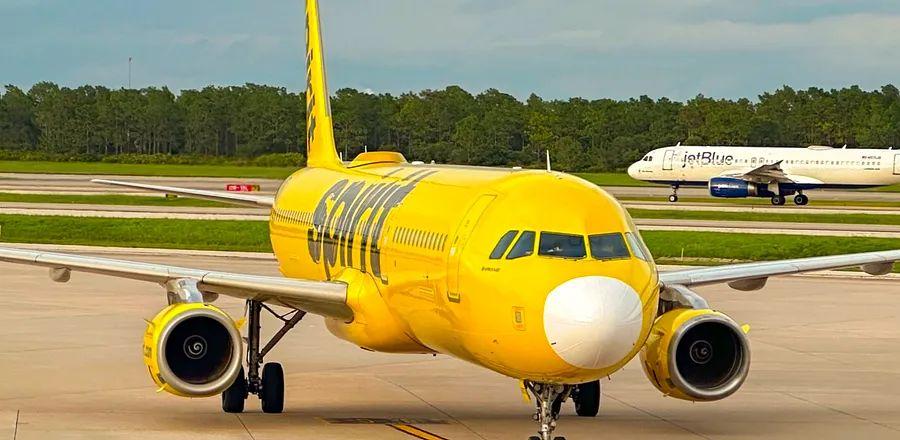JetBlue and Spirit's Merger Is Off. Is This a Positive Development?

On January 16, a federal court judge blocked JetBlue Airways' planned $3.8 billion acquisition of Spirit Airlines due to antitrust concerns. This ruling stemmed from a lawsuit filed by the U.S. Justice Department in March 2023 aimed at halting the deal. The suit argued that the merger would "allow JetBlue to remove its largest ultra-low-cost competitor, further consolidate the airline industry, and negatively impact American travelers."
Reasons for the merger's rejection
The merger between JetBlue and Spirit was turned down by a federal judge who determined it breached the Clayton Antitrust Act, which forbids mergers and acquisitions that significantly reduce competition.
Since JetBlue's routes overlap with those of Spirit Airlines in several markets, the merger would have diminished competition in these areas. JetBlue's claim to cut seat capacity on the acquired Spirit Airlines planes did not strengthen its case, nor did its misstep of revealing plans to raise fares by as much as 40 percent post-merger, according to a report from Law360.
JetBlue contended that the merger would actually enhance market competition by positioning the airline as a stronger competitor against the "Big 4" (American, Delta, Southwest, and United), offering more options for consumers. However, the judge ruled that the merger would ultimately harm a "large category of consumers" who depend on Spirit for affordable prices; the defendant airline could not prove that these consumers would be spared from negative impacts.
“The Spirit Effect:” Implications of the blocked merger for travelers
Attorney General Merrick Garland declared, "Today’s ruling is a win for millions of travelers who would have encountered higher fares and fewer options had the JetBlue-Spirit merger proceeded," in a press release regarding the U.S. District Court of Massachusetts decision.
With the merger blocked, JetBlue and Spirit Airlines will continue to operate independently while potentially appealing the decision, submitting a modified merger proposal that safeguards fare structures and routes, or receiving offers from other airlines. For instance, if Frontier Airlines were to revive its 2022 merger proposal to form a combined budget airline with Spirit, such a bid might secure Justice Department approval due to its preservation of the discount fare model and less route overlap.
For now, Spirit’s low-cost fares are expected to stay intact, compelling Spirit’s competitors on those routes to factor in these prices when setting their own fares. Consequently, even if you don’t intend to fly Spirit Airlines, ticket prices on Spirit-served routes are likely to remain lower. This phenomenon is referred to by Justice Department lawyers as the “Spirit Effect,” where “Spirit’s market presence pressures other airlines, including JetBlue, to reduce their fares.”
The “Spirit Effect” can be observed in JetBlue’s pricing for flights between New York’s La Guardia Airport (LGA) and Florida. This March, one-way fares on JetBlue from LGA to Fort Lauderdale, where Spirit operates regularly, average around $119, according to JetBlue’s website. In contrast, flights from LGA to Jacksonville, Florida, where Spirit doesn’t fly, are priced at an average of about $194, reflecting a 63 percent price premium for a shorter journey. While other factors could influence these prices, JetBlue’s inadvertently disclosed pricing strategy indicates that the mere presence of Spirit's competition may help lower fares.
What lies ahead for Spirit?
What benefits consumers may not always align with airline profitability or survival. Following the ruling, Spirit Airlines’ stock dropped by 47 percent, not solely due to shareholders missing out on JetBlue's premium offer. Spirit reported losses exceeding $263 million in the first three quarters of 2023, attributing the downturn to "softer demand for our product and discounted fares in our markets, leading to disappointing results."
Given Spirit Airlines’ ongoing losses and without JetBlue to support it, could the airline need to raise prices or take even bolder steps to ensure its survival? Given Spirit’s model of low fares for minimal service, persuading consumers to pay more for its flights will be a tough sell.
Therefore, without a significant increase in demand, Spirit may need to explore other alternatives. One possibility is finding a new buyer, as noted by Helane Becker, an airline analyst at TD Cowen, who told Reuters that Spirit’s recent capital raise provided funding that could potentially be used for a self-financed Chapter 11 filing, essentially a reorganization plan.
Implications for the Future of Airline Mergers
The Justice Department's court win may set off a chain reaction throughout the airline industry. Alaska’s newly announced merger with Hawaii Airlines could be jeopardized if the government decides to contest that arrangement as well. Moreover, additional antitrust actions may be on the horizon, especially following President Biden’s post-trial statement on January 16: "My administration will keep fighting to safeguard consumers and uphold our antitrust laws."
Regardless of how market conditions evolve, JetBlue and Spirit will remain competitors for travelers in the near term, with travelers likely to continue seeing discounted fares in Spirit’s service areas for the foreseeable future.
Evaluation :
5/5



